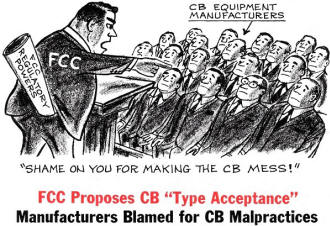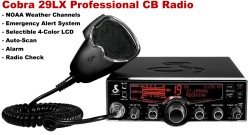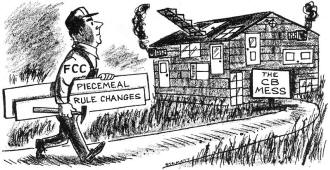FCC Proposes CB "Type Acceptance" - Manufacturers Blamed for CB Malpractices
|
|
In all-too-typical style, the Federal Communications Commission (FCC) decided to look for a scapegoat it could not just blame for but strong-arm a solution for claimed problems plaguing Citizen Band (CB) radio as it was rapidly becoming a popular hobby in the 1960s. In the same manner in which bureaucrats blame gun and steak knife manufacturers for the abusive actions of a minority of their products' users, the FCC sought to curtail improper (maybe even illegal) operation of CB radios by imposing type certification and feature restrictions on equipment manufacturers. To demonstrate its magnanimity , though, the FCC offered to give companies half a year to deplete their existing inventories. At the time and through 1977, CBs had 23 channels, after which time 40 channels became the new mandate, with manufacturers again given a period of time to sell off their stock. FCC Proposes CB "Type Acceptance" - Manufacturers Blamed for CB Malpractices
Type acceptance is a formal FCC method of controlling the manufacture of transmitting equipment. If the proposal becomes law, the FCC would check out the operating characteristics of sample CB transceivers submitted to the FCC by the manufacturers. Approval by the FCC would be required before a CB unit could be offered for sale to the general public. With regard to CB equipment now in use, the FCC docket proposes that all transceivers have a five-year life, or amortization period. In addition, the new rule would allow a six-month period after finalization of the rule change wherein manufacturers of CB equipment could dispose of stock on hand that might not meet "type acceptance."
The only external controls accessible to the user would be: the a.c. or d.c. power plug, microphone connection, antenna connection, on-off switch and volume control, channel selector switch (with a maximum selection of 23 channels), transmit-receive switch, and a switch to enable the use of the modulator amplifier for public address. Missing from CB transceivers under type acceptance would be the following typical controls: squelch (!), S-meter or any type of r.f. output meter/indicator, connections for selective calling, fine or "delta" tuning control, r.f. gain or tone controls, panel crystal socket, voice enhancement switch or control, earphone jack, etc. Manufacturers were given until March 27 to file comments on the proposed docket. As this magazine went to press, no manufacturer had been able to formalize objections to some of the proposed changes. The Manufacturers Did It. Attending the Washington meeting were representatives of practically all the major CB equipment trade papers. The FCC had called the meeting to discuss with equipment manufacturers improved compliance by CB users to the Part 95 CB Rules and Regulations. As the 75 attendees of the meeting sat in somewhat stunned silence, it was apparent that all of those present were being blamed for every ill to befall CB - including what the CB user says on the air and exactly how the CB'er uses his equipment! Although many of the attendees made various suggestions and offers of cooperation - if the FCC would provide guidelines - this part of the meeting accomplished little. The Walkie-Talkie Gossip. Almost as an afterthought, the FCC announced at the Washington meeting that newspaper and magazine stories concerning an impending frequency change for the 100-milliwatt walkie-talkies were not true. Although the problem (if there really is one to begin with - Ed.) of interference between the 5-watt CB transceivers and walkie-talkies is being studied, no "imminent" change in the appropriate Part 15 Rules and Regulations was foreseen. Heath Asks for Kit Recognition. In a separate action, but noted by the FCC in the proposed type acceptance docket, the Heath Company has filed a petition requesting a special exception for CB gear assembled by kit builders. As implied above, the type acceptance proposal would eliminate all CB transceivers not produced under the direct control of a specific manufacturer. No allowance is made in the present proposal for CB transceiver kits. * Type acceptance is not something created. just to bedevil CB'ers. Type acceptance of transmitters is presently required for all radio services except CB and ham radio. Editorial Comment
Isn't it time that the FCC took a long, hard, serious look at CB as it really is? Piecemeal-legislation and rule changes cannot resolve the problems afflicting CB. The FCC has been victimized by its own poor planning and appalling disinterest in the wants or desires of hundreds of thousands of the very citizens it supposedly represents. Continual "reinterpretations" of the CB rules will not solve the basic problem of how to "police" the CB'ers already on the air. Certainly the FCC doesn't seriously envision the day when CB will be legislated out of existence. What does the FCC think would happen to all that equipment? Wouldn't the "policing" problem become a national scandal if the CB rules were suddenly junked? The CB equipment manufacturers did not "create" CB. In fact, for the most part, the equipment manufacturers have had little to do with or to say about the CB rules. It seems rather ironic that the FCC finds it apparently impossible to shoulder the burden of guilt for the so-called CB "mess." Isn't it time the FCC recognized that there are only two feasible solutions to the CB problem? The FCC can either legislate the CB hobbyists to a new band of radio frequencies; or move the legitimate - but abused - CB user to a new, small business band. Oliver P. Ferrell, KOD3631
Posted November 7, 2018 |
|



